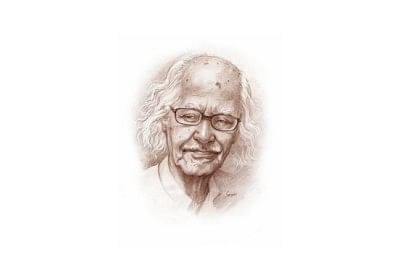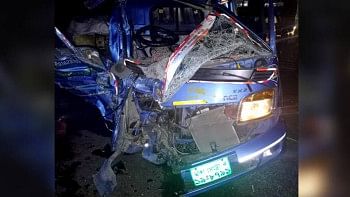<i>Kabir Chowdhury passes away </i>

Kabir Chowdhury, a national professor who became the icon of anti-communalism through his decades-long active stance against the forces of evil and injustice, succumbed to a cardiac arrest yesterday.
The reputed academic, considered as a voice of conscience during many national crises, was 89.
Prof Chowdhury breathed his last sometime between 3:30am and 6:00am in his sleep at his Naya Paltan residence in the capital, family members said.
He left behind his wife, three daughters, grandchildren and a host of relatives, well wishers and admirers to mourn his death.
As soon as news of his demise went out, grief-stricken relatives, friends, intellectuals, cultural personalities, journalists, publishers, leading politicians, ministers and lawmakers rushed to his house.
For many, it was difficult to believe that the legendary writer, who had gone beyond the scholarly arena to identify himself with a number of defining movements in this country, was no more.
A number of eminent citizens were heard saying that have lost "a guardian, a guide.”
Prime Minister Sheikh Hasina paid rich tributes to Prof Chowdhury by placing a wreath beside his body at Gazi Bhaban. In a very sombre mood, Hasina stayed for around five minutes besides his body and also prayed for his eternal peace. Hasina also talked to his wife, daughters, and family members.
In line with his last wishes, Prof Chowdhury was laid to eternal rest at Mirpur Intellectuals' Graveyard after Magrib prayers.
Winner of numerous awards, Kabir Chowdhury had expressed the desire that his body not be taken to a public place such as the Central Shaheed Minar, said his daughter Shaheen M Kabir.
Prof Chowdhury's body was kept on the fourth floor of Gazi Bhaban at Naya Paltan. He lived on the seventh floor of the building.
His namaz-e-janaza was held at Dhaka University Central Mosque after Asr prayer. He was accorded a guard of honour as a mark of respect by a police contingent with trumpets playing a dirge after the janaza.
Many social, political, educational and government bodies paid their last respect to him.
Born in 1923 in Brahmanbaria, Kabir Chowdhury studied English Literature at Dhaka University in the early 1940s and joined the university as a teacher in 1974.
He wrote around 250 books.
For his contribution to education, literature and social movements, he secured many prestigious awards in and outside the country.
Prof Chowdhury played a leading role in many movements in the country, especially in the anti-communal movement, movement to establish democracy, and significantly in the movement to ensure the trial of those who had committed crimes against humanity and war crimes during the War of Liberation of Bangladesh in 1971.
“He was always very much vocal against communal and fundamental forces. He was never afraid to raise his voice of protest against injustice…no matter who was doing the injustice,” said journalist Shahriar Kabir, a close ally of Prof Chowdhury in the movement for the trial of war criminals.
Dhaka University Vice Chancellor Prof AAMS Arefin Siddique said, “Whenever this country nation fell into a crisis, he [Prof Chowdhury] showed the path to an overcoming of it.”
Prof Chowdhury, it may be mentioned, had returned home on Saturday after a successful pacemaker replacement at city's Birdem Hospital.
“He was fine when he went to bed on Monday night,” said Shaheen Kabir, a professor of English at Jahangirnagar University.
“He woke up from sleep once around 3:00am [Tuesday] and had some water and also went to the washroom by himself. But, he did not respond when he was called at around 6:00am,” said theatre activist Ramendu Majumder, who is Prof Chowdhury's brother-in-law.
Some compare Kabir Chowdhury's demise as dignified as his personality.
“He led a dignified life and left us in a dignified manner,” Ramendu noted.
Eminent cultural activist and freedom fighter Nasir Uddin Yusuf Bachhu described Prof Chowdhury as an individual who had crossed the arena of academic excellence to play a significant role in a wider national sphere.
“I am sure that we will not find such a person among us in the near future,” he added.
At his residence following his funeral, many expressed the belief that it was a must to ensure the trial of the war criminals of 1971 as a way of demonstrating ultimate respect to Prof Chowdhury's soul.
Both Awami League General Secretary Syed Ashraful Islam and Law Minister Shafique Ahmed promised to complete the trial of war criminals to make Prof Chowdhury's dream come true.
HIS LAST WISHES
Family members said Kabir Chowdhury had asked to be buried promptly, definitely within seven or eight hours of his death. His namaz-e-janaza, said he, should be held in the nearest mosque and there should be only one janaza.
He asked to be buried in a public graveyard, at Azimpur or Banani or some such place, where another deceased could find his last resting place over his remains.
He also asked that no milad, qul-khani or chehlum be organised to mark his passing away. If it is considered necessary a citizens' memorial meeting may be held, but that also can be dispensed with.
MEMORIAL MEETINGS
Bangla Academy will hold a commemorative meeting for Prof Chowdhury on its premises at 4:00pm on December 17. Sammilito Sangskritik Jote, an alliance of cultural bodies, will organise a citizens' memorial meeting at the Central Shaheed Minar on December 19, said family sources.

 For all latest news, follow The Daily Star's Google News channel.
For all latest news, follow The Daily Star's Google News channel. 



Comments